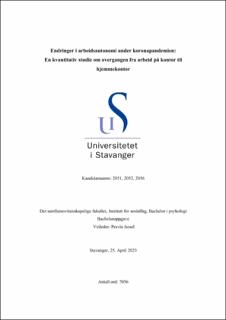| dc.contributor.advisor | Israel, Pravin | |
| dc.contributor.author | Frafjord, Camilla Opsal | |
| dc.contributor.author | Ingvarsdóttir, Tuva | |
| dc.contributor.author | Runestad, Silje | |
| dc.date.accessioned | 2023-06-14T15:51:25Z | |
| dc.date.available | 2023-06-14T15:51:25Z | |
| dc.date.issued | 2023 | |
| dc.identifier | no.uis:inspera:144958821:145396652 | |
| dc.identifier.uri | https://hdl.handle.net/11250/3071396 | |
| dc.description.abstract | Studien undersøker om det har skjedd endringer i opplevd autonomi blant arbeidstakere i Rogaland som måtte arbeide på hjemmekontor som følge av koronapandemien. Studien undersøker også om det foreligger kjønnsforskjeller i opplevd autonomi blant arbeidstakerne. Vi forventet å finne en økning i opplevd arbeidsautonomi på hjemmekontor, og kjønnsforskjeller. Vi forventet at kvinner skulle oppleve mindre arbeidsautonomi enn menn. Studien har en kvantitativ tilnærming, hvor en spørreundersøkelse ble anvendt for å undersøke hypotesene. I studien var det totalt 141 deltakere, hvorav 114 ble kvalifisert for videre analyse. I analysen av dataene ble det brukt deskriptiv analyse, paired samples t-tester og independent samples t-tester. Funnene viser en økning i opplevd arbeidsautonomi på hjemmekontor under nedstengingen, samt ingen kjønnsforskjeller. Det har blitt rapportert at autonomi har positive konsekvenser for arbeidstakere. Det kan av den grunn være gunstig at bedrifter i større grad forsøker å tilrettelegge for hjemmekontor hvor det er mulig. | |
| dc.description.abstract | The study investigates whether there have been changes in perceived autonomy among employees in Rogaland who had to work from home because of the COVID-19 pandemic. The study also examines whether there are gender differences in perceived autonomy among the employees. We expected to find an increase in perceived work autonomy when working from home, as well as gender differences. We expected that women would experience less work autonomy than men. The study used a quantitative approach, where a questionnaire was used to investigate the hypotheses. There were a total of 141 participants in the study, of which 114 were qualified for further analysis. Descriptive analysis, paired samples t-tests, and independent samples t-tests were used to analyze the data. The findings show an increase in perceived work autonomy when working from home during the lockdown, as well as no gender differences. It has been reported that autonomy has positive consequences for employees. Therefore, it may be beneficial for companies to try to facilitate working from home where feasible. | |
| dc.language | nob | |
| dc.publisher | uis | |
| dc.title | Endringer i arbeidsautonomi under koronapandemien: En kvantitativ studie om overgangen fra arbeid på kontor til hjemmekontor | |
| dc.type | Bachelor thesis | |
